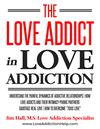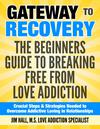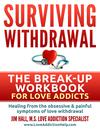25 Maxims for Establishing Healthy BoundariesBy Jim Hall MS, Love Addiction Expert, Relationship Recovery Coach
Establishing Functional Boundaries is a vital attribute to living healthier and froming secure healthy relationships.
One of the core issues for insecurely attached love addicts and codependents crucial to a successful recovery is learning to establish and maintain strong/healthy boundaries.
What is a boundary?
A boundary is a method of setting limits that help define who you are and enhance your sense of self. Boundaries are personal expectations and needs required to feel secure in relationships and interactions with others. Our boundaries dictate what we will tolerate or not tolerate from others; when to say no and when to say yes. One of the primary purposes of boundaries is to contain and protect your emotional and physical well-being.
"The heart of self-care is establishing boundaries."
Boundaries are like having invisible and symbolic "fences" that have these four purposes:
1. To keep people from coming into our space, disrespecting or abusing us (emotionally and physically) 2. To keep us from going into the space of others and abusing them 3. Boundaries define our identity- giving each of us a way to embody our sense of "who we are" 4. To protect us from internalizing the feelings, actions, or words of others for what we are not responsible for
Boundaries show up when we are listening and communicating with another, sharing or receiving another person physically, sexually, spiritually, intellectually, or emotionally - This process, when healthy, creates a secure relationship, an intimate connection.
Why Are Boundaries Important in Relationships?
Establishing functional boundaries is vital to health and well-being and attaining healthy, fulfilling intimate relationships.
When you establish and maintain functional boundaries, you can protect and contain yourself while remaining vulnerable enough for intimacy but not so vulnerable that you are easily manipulated, controlled, or wounded.
They protect our self-esteem, values, principles, spirituality, behaviors, and identity.
Healthy boundaries—set the stage for love, strength, happiness, well-being, and service for the good of self and others.
Impaired boundaries in addictive codependent patterns occur either as having emotional walls (avoidance) or boundaryless (love addict). In either of these extremes, intimate relationships deteriorate and can become downright dysfunctional. Established boundaries protect you from others who attempt to violate, control, or manipulate you. They shelter you from letting others dictate your beliefs, emotions, and choices.
Functioning boundaries guard against internalizing negative feelings, actions, or words of others-- and let others know our limits (what we will tolerate or not). They send out energy to others, an identifiable shape that emerges around us of our beliefs and preferences.
Ultimately, establishing and setting firm boundaries is a demonstration of love and self-care. Where allowing another to violate our emotional or physical boundaries is not.
When we learn to establish boundaries from a place of love and self-care, we attract healthier people into our lives and invite relationships to thrive and grow. We can love and experience intimacy without losing ourselves.
25 Maxims on Embracing Funtional Boundaries
|
|
|



